Trust Assured Asset Allocation Trust
Having worked hard to buy your own home, paying off your mortgage over several decades perhaps it is understandable that you want to ensure that it will ultimately pass to your family and that it will be protected for their benefit.
There are, however, circumstances in which your home, or indeed part of it, could be lost to them.
We have listed below just a few:
Probate Fees Did you know that Solicitors, banks, and professional executors charge a percentage of your estate to handle the probate on behalf of your beneficiaries. Banks may offer you a free Last Will and Testament, but they also write themselves in as the main executors for anything up to 5% of your estate value. Solicitors and Barristers also charge similar fees, and some may even charge an hourly rate on top of their percentage fee.
For example, if you have a home worth £300,000, and a professional executor charges 5%, your home value alone is £15,000 in fees.
By placing your home into a Trust Assured Asset Allocation Trust, it does not need to go through probate, as your beneficiaries become the legal owners immediately upon your death. This benefit of the trust alone makes it a worthwhile investment for your family’s future, but there are more benefits:


Bloodline Protection Should you or your spouse pass away, and the survivor remarry, the new spouse might legally be entitled to half of your home. If they outlive your spouse, then your family home may be lost and go to their beneficiaries, and not your own children.
The same applies to your beneficiaries. Should they divorce after inheriting some or all of your family home, the divorce proceedings can award half of the inherited property to the outgoing spouse.
By placing the home into a family trust, you protect your bloodlines inheritance, which passes from you to your children, and then to their children. Spouses can have right of ownership to the home.
Creditors Should you or your family fall into financial difficulty, the Asset Allocation Trust, prevents creditors placing a charge onto the property in pursuing a debt. Whether it is protection for yourself or your children after inheriting, the same rule applies.
Intestacy Should you pass away without a Will, or without a valid Will, the Rules of intestacy will apply to your estate. The construction of an Asset Allocation Trust names the beneficiaries of the family home in the trust deed, so any potential claimants will have no claim on what the largest asset value of within your estate is.
Full Faculties We do not like to think about our health deteriorating in our latter years, but the plain truth is, as we get older, our bodies change. We may develop dementia, or Alzheimer’s Disease, which affects our mental health, or physically, we may suffer a stroke, losing the ability to talk, or move some of our limbs. Nobody knows what our future may hold. By placing the home into a family trust, your trustees will be able to make decisions relating to the home on your behalf. They will be the ones who have your best interests at heart, as you named them for that purpose.
Should your children need to make decisions on your behalf, without a trust or a Lasting Power of Attorney in place, they will have to apply to the Court of Protection to be able to do so. This will cost in the region of £5000 but may even be more depending on the circumstances.
Children Inheriting Whilst most of us wish our children to inherit our home, timing can make all the difference. If a child is having issues with drugs, alcohol, gambling, or they are vulnerable and easily led, their share of your home could be lost to other parties and not pass to your children or grandchildren as you intended.
By placing the home into trust, you can appoint trustees to act on behalf of your beneficiary who may have some of the above issues. The trustees, who may be other siblings, can use the trust at their discretion, in a bid to protect the wayward beneficiary from him or herself.
Transferable The trust is completely transferable, and completely flexible. Should you wish to sell the home at some point in the future, you can sell without any problems. If you are selling to downsize, you can purchase a new home, and place it into the trust. Or you can sell, and simply unravel the trust.
Raising Capital, the trust allows for money to be raised on the property by way of a lifetime mortgage or equity release. Funds can be raised for any purpose including IHT planning, Home Improvements assisting family members or even buying a holiday home.
Your beneficiaries can also benefit from the flexibility of the trust. They might decide to sell your home after inheriting to pay the mortgage off their own home. They can then use the trust to place their home into it, protecting for their children’s future.
IHT Planning the Trust Assured Asset Allocation Trust cannot be used to avoid inheritance tax, but its function will help to plan for your inheritance tax, if you happen to be over the threshold of £650,000. (£325,000 for a single person)
It is important to know that during your lifetime nothing changes on a day-to-day basis; however, you have the peace of mind that you have secured your property for the long-term future prosperity of your family. You carefully select your trustees, these are people you trust, such as your children. Alongside your children you are the key trustee with the rights to appoint or change trustees, you remain in full control.
Your home is placed into the Asset Allocation Trust by drafting a ‘trust deed’ this sets out the rules and potential beneficiaries of the property. Your home is re-registered in the names of your chosen trustees at the Land Registry.
The Trust Deed allows for you to live in your home until your death. It also gives you the power to hire and fire the trustees; therefore, if the trustees do not comply with your wishes, you simply remove them as trustees and appoint replacements who will comply with your wishes. This gives you full control over the property as if it was still in your ownership.


